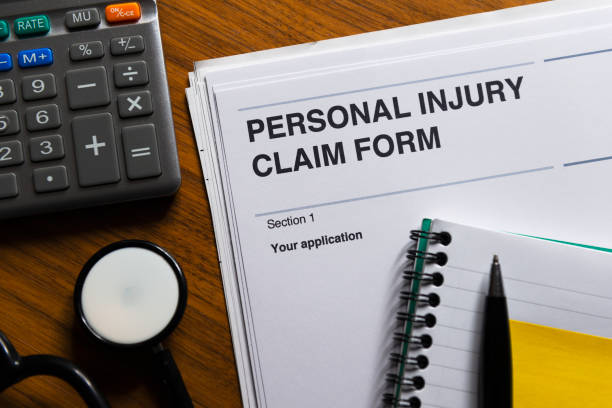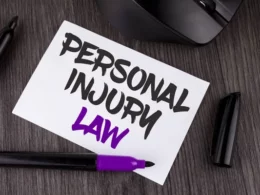If you’ve been injured in an accident and someone else is at fault, you may be entitled to compensation. The process of filing a personal injury claim can be confusing and overwhelming, but understanding the steps involved can help you navigate the process with confidence.
In today’s article, you will find out the simple process of a personal Injury claim. But first, what even is a personality Injury claim?

What is a Personal Injury Claim?
If you have been injured because of someone else’s negligence, you may be entitled to compensation through a personal injury claim. A personal injury claim is a legal process where the injured person (plaintiff) seeks financial compensation from the party they believe is responsible for their injuries (defendant).
Definition
A personal injury claim is a civil lawsuit that seeks compensation for injuries caused by someone else’s negligence or intentional harm.
Personal injury claims can arise from a variety of situations, including car accidents, slip and falls, medical malpractice, and product liability.
Personal injury claims are based on the legal concept of negligence, which means that the defendant had a duty to act reasonably and failed to do so, causing harm to the plaintiff.
To win a personal injury case, the plaintiff must prove that the defendant was negligent and that their negligence caused the plaintiff’s injuries.
Types of Personal Injury Claims
There are many different types of personal injury claims, including:
- Car accidents
- Truck accidents
- Motorcycle accidents
- Pedestrian accidents
- Bicycle accidents
- Slip and falls
- Dog bites
- Medical malpractice
- Product liability
Each type of personal injury claim has its own unique set of legal issues and challenges.
For instance, car accident cases often involve complex issues of fault and insurance coverage, while medical malpractice cases require expert testimony to prove that the defendant breached the standard of care.
Suppose you have been injured in an accident. In that case, it is important to consult with an experienced personal injury attorney who can help you navigate the legal process and maximize your compensation.
The Process of Filing a Personal Injury Claim
Here are the process involved in filling a personal injury claim:
Gather Evidence
The first step in filing a personal injury claim is to gather evidence. This includes collecting any documents related to the accident, such as police reports, medical records, and witness statements.
Try to take pictures of the accident scene and any injuries you sustained. This evidence will help establish liability and damages in your case.
Medical Treatment and Records
After an accident, seeking medical treatment should be your top priority. Not only is it important for your health, but it also creates a record of your injuries that can be used as evidence in your case.
Now you have to keep track of all medical bills and expenses related to your injury, as you may be able to recover these costs in your claim.
Consulting with a Personal Injury Lawyer
Consulting with a personal injury lawyer can help you understand your legal options and ensure that your rights are protected. A lawyer can also help you navigate the complex process of filing a personal injury claim and negotiating with insurance companies.
Filing a Complaint
You must file a complaint in the appropriate court to file a personal injury claim. This complaint should include a detailed description of the accident, the injuries you sustained, and the damages you are seeking. Your lawyer can help you draft and file this complaint, as well as represent you in court if necessary.
Remember, the process of filing a personal injury claim can be complex and time-consuming. It’s important to seek legal advice and guidance to ensure that you receive the compensation you deserve.
The Legal Process
When you file a personal injury lawsuit, there is a legal process that you will have to go through. This process can be broken down into several stages: pre-trial, discovery, mediation, trial, and judgment.
Pre-Trial
The pre-trial stage is the period before the trial begins. During this stage, both the plaintiff and defendant will gather evidence and prepare their cases. This can include interviewing witnesses, gathering medical records, and consulting with experts.
Discovery
The discovery stage is when both parties exchange information and evidence. This can include written questions, known as interrogatories, and requests for documents. Depositions may also be taken, which are interviews conducted under oath.
Mediation
Mediation is a process where a neutral third party helps the plaintiff and defendant come to an agreement. This can be a faster and less expensive alternative to going to trial. During mediation, both parties will present their cases and try to reach a settlement.
Trial
If mediation is unsuccessful, the case will go to trial. Both parties will present their cases to a judge or jury during the trial. Witnesses may be called to testify, and evidence will be presented. The judge or jury will then make a decision based on the evidence presented.
Judgment
After the trial, a judgment will be made. If the plaintiff wins, the defendant will be ordered to pay damages. If the defendant wins, the plaintiff will not receive any compensation. In some cases, the judgment can be appealed.
Damages and Compensation
If you’ve been injured due to someone else’s negligence, you may be entitled to compensation for your damages. Damages are the losses you’ve suffered as a result of your injury, and compensation is the payment you receive to make up for those losses.
There are several types of damages you may be able to recover, and calculating compensation can be a complex process.
Types of Damages
There are two main types of damages you can recover in a personal injury claim: special damages and general damages.
Special damages, also known as economic damages, are the losses that can be easily quantified, such as medical expenses, lost wages, and property damage.
General damages, also known as non-economic damages, are losses that are more difficult to quantify, such as pain and suffering, emotional distress, and loss of enjoyment of life.
Calculating Compensation
The amount of compensation you receive will depend on the extent of your damages. In general, the more severe your injuries and losses, the higher your compensation will be.
To calculate compensation, your attorney will consider factors such as your medical expenses, lost wages, and future earning capacity, as well as the severity and duration of your injuries, and the impact your injuries have had on your life.
In addition to economic and non-economic damages, you may also be entitled to punitive damages in some cases. Punitive damages are intended to punish the defendant for their actions and deter others from engaging in similar conduct in the future.
Pain and Suffering
Pain and suffering is a type of non-economic damage that refers to the physical and emotional pain and suffering you’ve experienced due to your injury.
This can include physical pain, emotional distress, loss of enjoyment of life, and more. Calculating pain and suffering damages can be difficult, as there is no set formula for determining their value.
Your attorney will consider factors such as the severity of your injuries, the impact your injuries have had on your daily life, and the duration of your pain and suffering.
Lost Wages
If you’ve had to miss work as a result of your injury, you may be entitled to compensation for lost wages. This can include both past and future lost wages.
To calculate lost wages, your attorney will consider factors such as your salary, the number of hours you missed, and any future earning capacity you may have lost as a result of your injury.
Hiring a Personal Injury Attorney
If you have been injured in an accident, hiring a personal injury attorney can help you navigate the legal process and maximize your compensation. Here are some important things to consider when hiring a personal injury attorney:
Experience and Expertise
When hiring a personal injury attorney, it is important to choose someone with experience and expertise in handling cases similar to yours.
Find an attorney who specializes in personal injury law and has a track record of success in cases like yours.
An experienced attorney will be familiar with the legal process, know how to negotiate with insurance companies, and be able to build a strong case on your behalf.
Fee Agreements
Most personal injury attorneys work on a contingency fee basis, meaning they only get paid if you win your case. This can be a good option if you cannot afford to pay an attorney upfront.
However, it is important to understand the fee agreement before you sign anything. Ensure you know what percentage of your settlement or award the attorney will take as their fee and whether there are any additional costs, such as court or expert witness fees.
Contingency Fee Agreements
A contingency fee agreement is a contract between you and your attorney that outlines the terms of the attorney’s representation.
This agreement should include the attorney’s fee percentage, any additional costs, and the circumstances under which the agreement can be terminated. Make sure you read and understand the agreement before you sign it.
Most personal injury attorneys offer a free consultation, where you can discuss your case and ask questions about the attorney’s experience, fees, and contingency fee agreement.
Take advantage of this consultation to make sure you feel comfortable with the attorney and confident in their ability to represent you.
Dealing with Insurance Companies
If you have been injured and are filing a personal injury claim, you will likely have to deal with insurance companies.
This can be a complex and intimidating process, but it is important to understand the steps involved in working with both your own insurance company and the defendant’s insurance company.
Working with Your Insurance Company
The first step in dealing with insurance companies is to contact your own insurance company as soon as possible after the accident.
You will need to provide them with all relevant information about the accident and your injuries. This may include medical records, police reports, and witness statements.
Your insurance company will likely assign an adjuster to your case who will investigate the accident and determine the value of your claim.
It is important to be honest and forthcoming with your adjuster but also to be aware that they are working for the insurance company and may not always have your best interests in mind.
Throughout the process, it is important to keep detailed records of all communication with your insurance company, including phone calls, emails, and letters. This will help ensure that you have a clear record of what was said and agreed upon.
Working with the Defendant’s Insurance Company
If someone else’s negligence caused the accident, you will also need to deal with the defendant’s insurance company.
This can be a more challenging process, as the insurance company will be looking for ways to minimize their liability and pay out as little as possible.
When dealing with the defendant’s insurance company, it is important to be cautious and not to provide any information that could be used against you. You should also be aware that anything you say to the insurance company could be recorded and used as evidence in court.
If you are negotiating a settlement with the defendant’s insurance company, it is important to be prepared and to have a clear understanding of the value of your claim.
This may involve consulting with a personal injury attorney or other experts who can help you determine the true cost of your injuries and other damages.
Throughout the process, being persistent and advocating for your rights is important. This may involve pushing back against the insurance company’s initial offer and negotiating for a better settlement.
With the right preparation and approach, however, it is possible to successfully navigate the process of dealing with insurance companies and securing the compensation you deserve.
YOU SHOULD ALSO READ:
- Road Traffic Personal Injury Claims: A Comprehensive Guide
- Can You Get Legal Aid for Personal Injury Claims? Explained
- Personal Injury Claim Medical Examination: What to Expect and How to Prepare
- Personal Injury Claim: What You Need to Know About Broken Ankle Cases
- Personal Injury vs. Medical Negligence: Understanding the Key Differences












